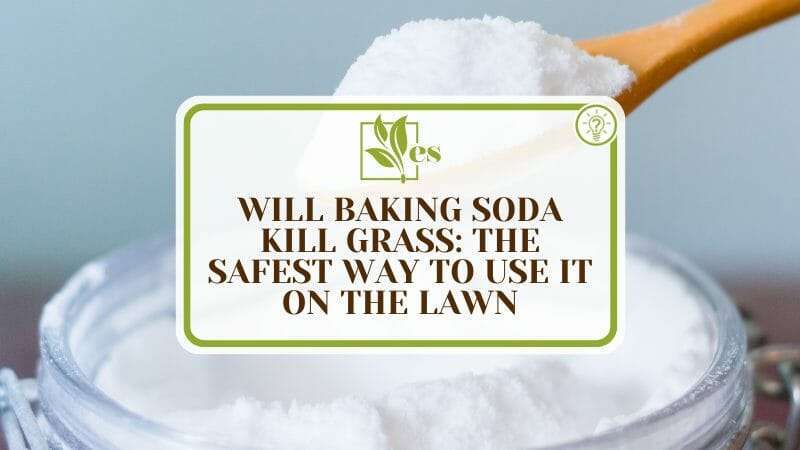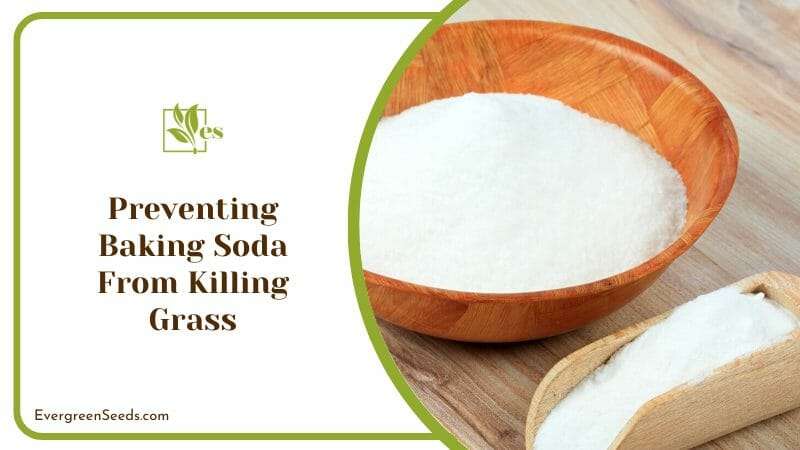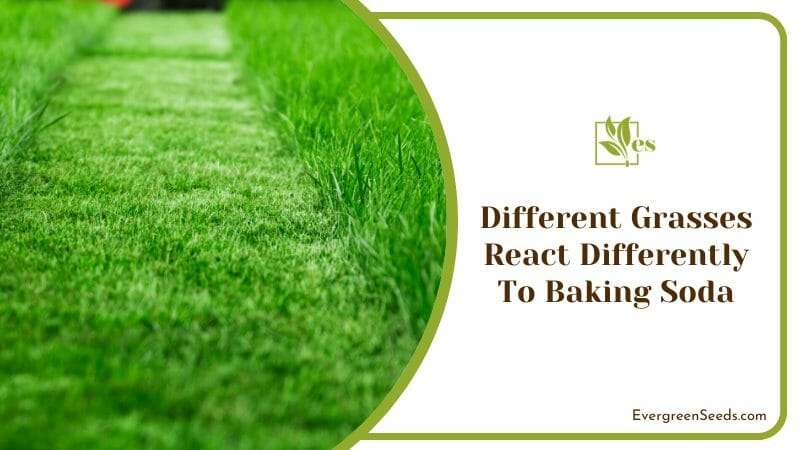Will baking soda kill grass when used as a DIY weed control agent on the lawn? Unfortunately, baking soda is very alkaline and kills weeds and grass by desiccating them completely. Using this chemical on your lawn frequently will also alter the chemistry of your soil. Please go through our guide to learn when and how best to make use of this common kitchen product safely. On the other hand, avoid using diesel on your grass to kill weeds!

JUMP TO TOPIC
Will Baking Soda Kill Grass?
💥 Yes, it will – it is phytotoxic. It draws moisture from grass blades and seeds, dehydrating and killing them. Even in small concentrations, it can slow down the grass’s growth. That is why it is considered a non-selective herbicide, as it kills all types of weeds and grass from the lawn.
– Some Important Uses of Baking Soda in Lawns
Baking soda is very effective as a natural DIY homemade weed killer for lawns and turfs. You can use it in several forms and apply to thick weed patches on the lawn. You can also use it to intentionally kill invasive grasses that appear to be spreading beyond a designated boundary.
It can also be used in various mixtures to make fungicides and insecticides. The best results are obtained by regularly using foliar sprays made of baking soda.
Sodium bicarbonate is effective against common fungal diseases such as powdery mildew, root rot, and leaf spot disease of plants and grass. Effective pest control can be obtained by using baking soda to rid your grass of small pests like mealybugs, aphids, and spider mites, as well as larger ones like snails and slugs.
We all know that dog urine is quite harmful to grass because of its high acidity. Will baking soda neutralize dog urine if used as a remedy? The answer is that it will and is a very useful quick remedy to your dog peeing on the grass.
– Preventing Baking Soda From Killing Grass
Say you were using baking soda as a weed killer and accidentally spilled some onto the healthy patches of grass. Don’t worry; there are preventative steps you can take to prevent it from killing grass right away.

All you have to do is to use a generous amount of water to flush baking soda from the soil. If your soil is too compact, then a generous amount of raking might be required to loosen at least the top layers. This would allow water to reach the lower layers better.
Don’t worry if spillover from baking soda kills grass on the lawn. In moderate cases, the grass will likely grow back after deep flushing with clean water. Even if the baking soda harms the grass permanently, you can still grow it back by reseeding or sodding.
– Using Dry Baking Soda to Kill Grass
Using dry baking soda is useful when you want to kill weeds and grass from a selective patch only. This gives you better control over what to expose to the soda and what parts to protect.
One way is to sprinkle baking soda after measuring about one tablespoon. Take care that the weather is not windy that day; otherwise, most of this soda will get blown off to the side. To be 100 percent effective, you may have to reapply it once or twice.
Baking soda is highly alkaline and has the potential to alter the soil’s pH level after multiple uses. That is why you need to flush the soil with lots of water after the grass and weeds have been killed off. Hot tub water also alters soil’s pH so be extra careful if you have one.
– Using Baking Soda Spray to Kill Grass
Mix baking soda and water equally to make a foliar spray that will kill weeds and any patch of grass you might want to get rid of. Mix them both thoroughly, and then put this mixture in a spray bottle. Adding a surfactant like olive oil or dishwashing soap will help stick the mixture to the grass better.
A baking soda spray will work quicker if the grass is moist or wet because its pores will be open and absorb more solution. That is why it is best to spray early in the morning before dew drops have dissipated.
Suppose the grass has not been watered for a while and is particularly dry, then it’s best to just water the lawn before spraying it with the foliar spray. Temperatures above 85 degrees Fahrenheit will further accelerate the absorption of baking soda into the grass and weed blades.
Spray this solution generously on the grass and weed patch of your choice. Then lightly sprinkle water to help make soda stick better to the grass. Like most natural remedies, you will need multiple weekly applications of this spray to produce any tangible effect.
– Different Grasses React Differently To Baking Soda
Baking soda will not only kill weeds but is also a potent grass killer for all grass types. However, some varieties tolerate it much better than others. For instance, it will kill crabgrass pretty rapidly.

Comparatively, Bermuda grass is much more resistant to spraying or sprinkling with baking soda. So if your Bermuda grass has crabgrass growing as a weed, then applying baking soda will kill crabgrass weeds permanently before producing any effect on Bermuda grass.
St. Augustine is another grass that cannot tolerate being treated with either baking powder or soda. The same goes for Zoysia, a resilient grass overall but dies instantly after coming in contact with baking soda.
Final note:
Yes, vinegar and soda together will kill grass when applied to it. Both vinegar and baking soda are quite corrosive to grass and other plants. Using them both together only makes their actions more potent.












